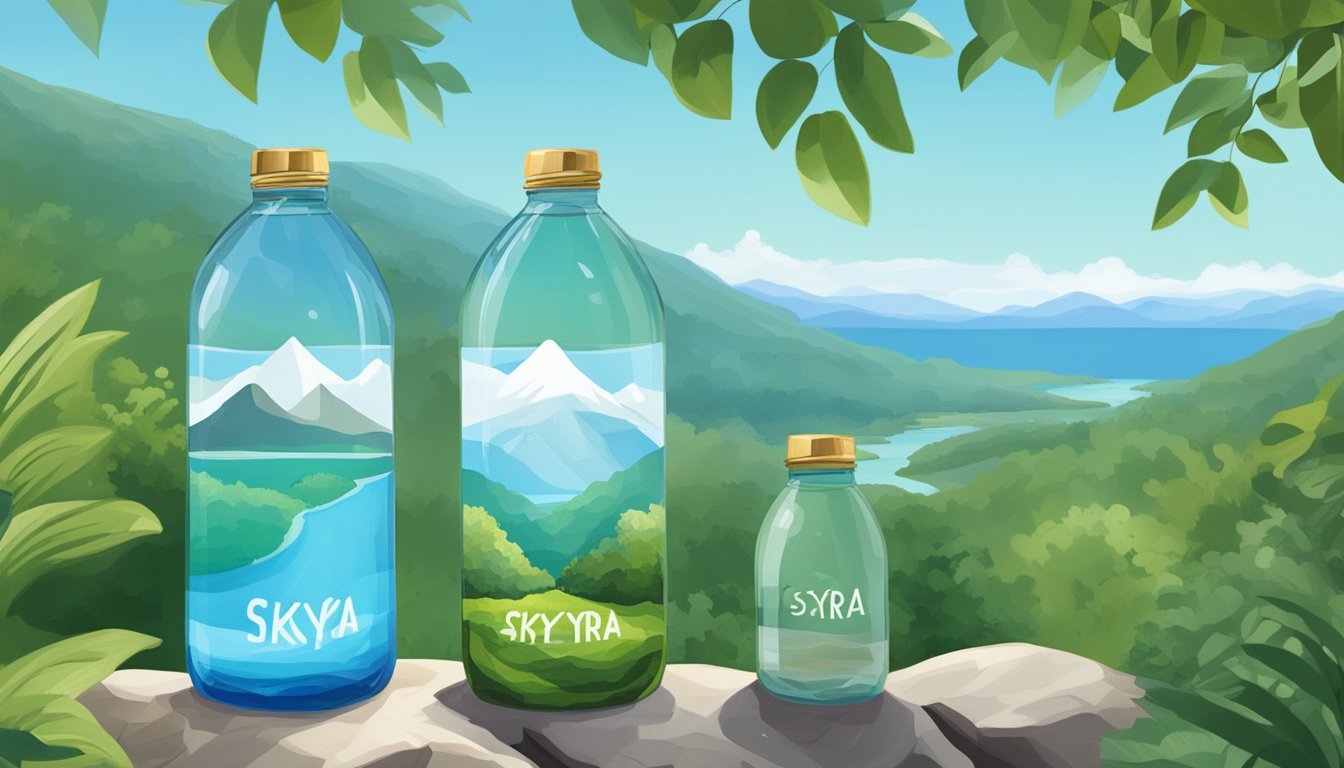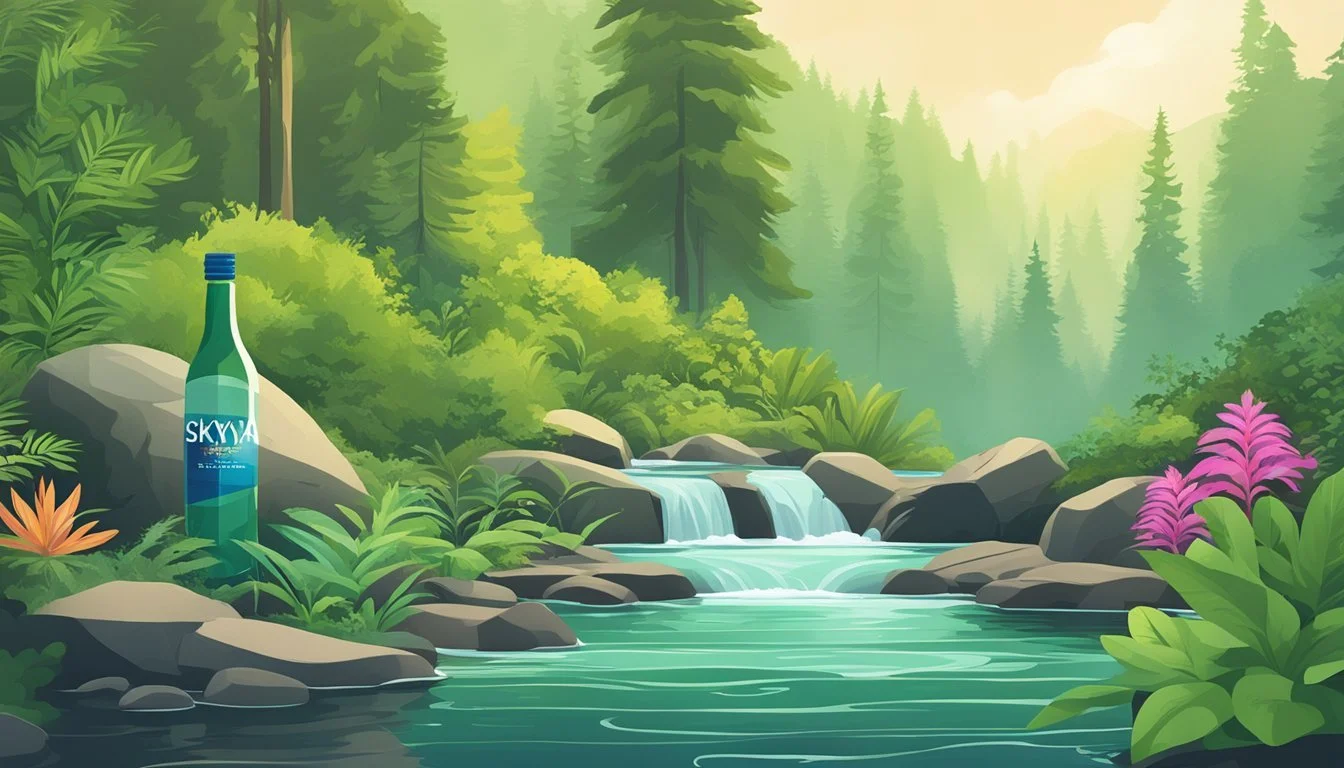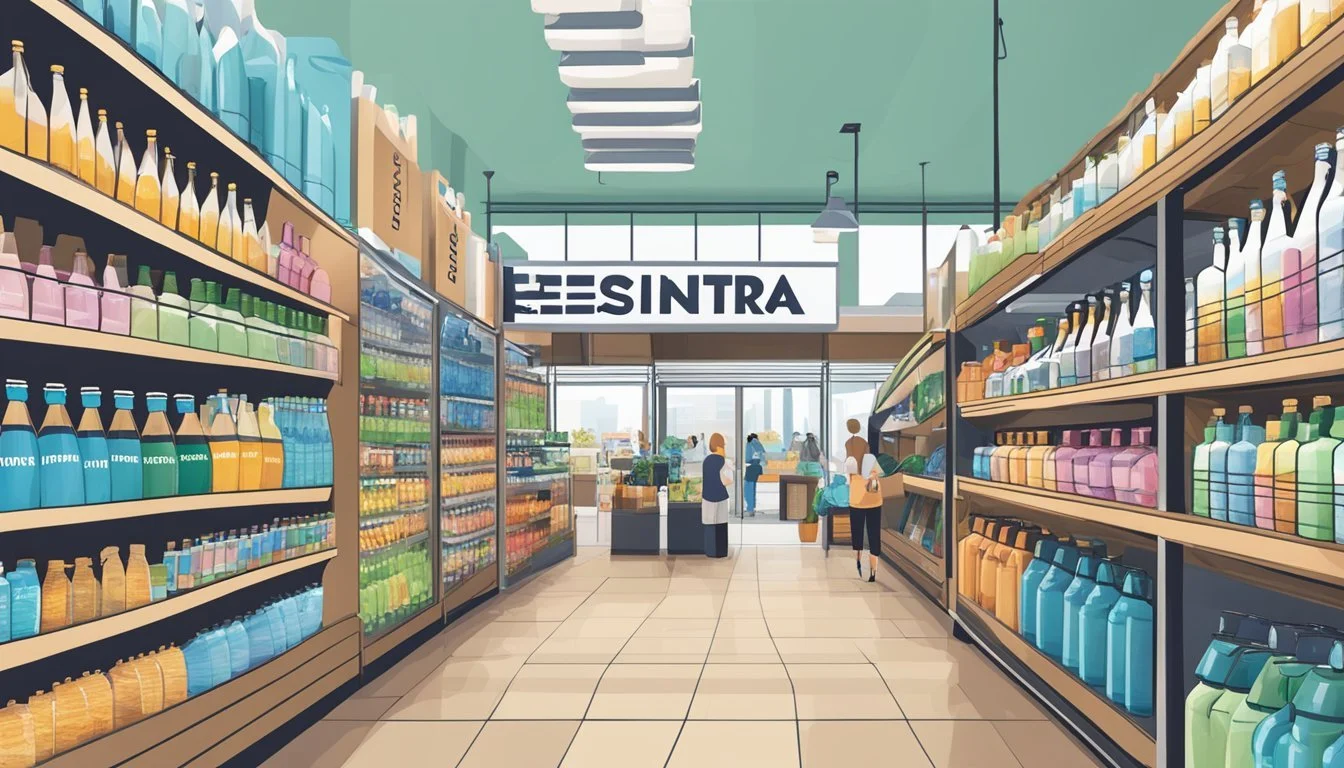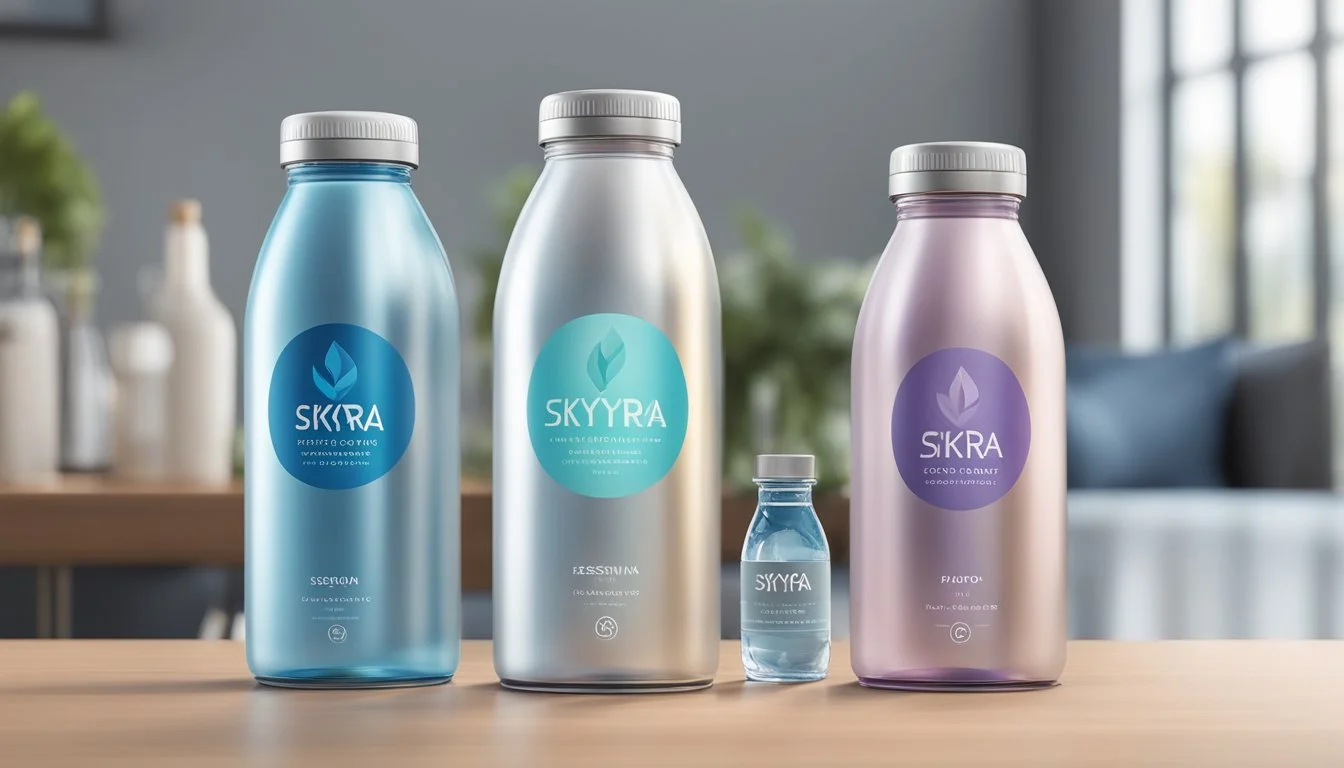Essentia vs. Skyra
Which Bottled Water is Better for You?
Deciding between Essentia and Skyra bottled water can feel like navigating a complex landscape of hydration options. On one hand, Essentia offers a high pH of 9.5, claiming superior hydration due to its ionized process. This makes it a favorite among those prioritizing alkaline water for potential health benefits.
Skyra, sourced from natural Icelandic springs, boasts purity and a naturally high alkaline level without any artificial processes. The water's crisp and refreshing taste resonates with those who prefer a more natural alternative. Both brands offer quality, but they cater to different preferences and hydration needs.
Consumers find Essentia’s smooth, clean mouthfeel to be exceptional for daily hydration. Skyra's allure lies in its natural origins and uncomplicated purity. For those making their choice, it often comes down to a preference for either scientifically enhanced hydration or the simplicity of nature in a bottle.
Background on Essentia and Skyra
Essentia Water is marketed as a premium brand known for its ionization process and alkaline pH. Founded in 1998, this bottled water undergoes proprietary ionization to remove acidic ions, boosting its pH to 9.5 or higher. The brand emphasizes hydration and health benefits.
Skyra Water originates from Iceland and is sourced from natural springs. It boasts a naturally high pH level of 8.88 due to its volcanic filtration process. Skyra highlights its pure and mineral-rich composition, aimed at consumers seeking natural hydration options.
Water Brand Source pH Level Key Features Essentia Purified water 9.5+ Ionized, high pH, electrolytes Skyra Icelandic springs 8.88 Natural, mineral-rich, volcanic source
Essentia incorporates electrolytes for taste and hydration, while Skyra relies on natural minerals from its spring source.
By focusing on water quality and purity, both brands cater to consumers looking for advanced hydration solutions with unique benefits.
Source and Processing
Essentia and Skyra are well-known bottled water brands. They both have unique sources and utilize advanced processing techniques to ensure water purity and quality. Let's explore their water sources, purification processes, and bottling practices.
Water Source Analysis
Essentia water starts as potable tap water. It is sourced from various locations, depending on regional availability and quality measures. This flexible sourcing allows Essentia to maintain consistent standards regardless of origin.
Skyra, on the other hand, claims to source its water from natural Icelandic springs. These springs provide naturally filtered water, enriched with essential minerals. The purity of the source water contributes to Skyra's distinct taste and mineral profile.
Purification Process
Essentia employs a rigorous multi-step purification process. It starts with Reverse Osmosis, followed by micro-filtration and ultraviolet exposure. This ensures the removal of contaminants and dissolved solids, achieving 99.9% purity. After purification, Essentia infuses the water with electrolytes and ionizes it to achieve an alkaline pH of 9.5 or higher.
Skyra maintains its natural mineral content by using minimal filtration. The water undergoes a simple filtration process to remove particulates without stripping away beneficial minerals. The low-intervention method helps to retain its natural properties, providing a naturally balanced alkaline pH around 8.0-8.5.
Bottling and Packaging
Essentia opts for plastic bottles, which are BPA-free, to ensure consumer safety. Their packaging is designed for convenience and practicality, aimed at active individuals seeking hydration on-the-go. They also focus on sustainability by encouraging recycling.
Skyra offers its product in glass bottles along with BPA-free plastic options. Glass bottles are known for maintaining water purity without the risk of chemical leaching. Skyra's elegant and environmentally conscious packaging appeals to consumers who prioritize both health and sustainability.
These insights into sourcing, purification, and packaging reflect Essentia’s and Skyra’s commitment to delivering high-quality bottled water to their customers.
Quality Indicators of Water
Quality indicators of water include several key factors that contribute to its overall safety and health benefits. These indicators cover pH levels, mineral content, and total dissolved solids (TDS), all of which help in determining the quality of water.
pH Levels and Alkalinity
The pH level of water measures its acidity or alkalinity, which is crucial for both taste and health benefits. Water with a pH less than 7 is acidic, while a pH greater than 7 is alkaline. Essentia water boasts a high pH due to its proprietary ionization process, making it an alkaline water choice.
Alkaline water enthusiasts argue that it helps neutralize acid in the bloodstream, improving metabolism and overall energy levels. However, extremely high pH levels can affect the taste, making it harsh or soapy. Skyra, on the other hand, also offers alkaline water but its pH levels vary slightly in comparison, influenced by its natural source in Iceland.
Mineral Content
Mineral content in bottled water greatly impacts its health benefits and taste profile. Essential minerals such as calcium, magnesium, and potassium, known as electrolytes, are often highlighted in bottled water advertisements. Essentia adds electrolytes during its purification process, ensuring a balanced mineral content.
Skyra, sourced from Iceland, naturally contains a blend of minerals due to its volcanic filtration. Minerals not only enhance the taste but also contribute to essential bodily functions such as bone health and muscle function. However, too many minerals can lead to an unwanted taste and potential health risks if consumed in excess over the long term.
Total Dissolved Solids (TDS)
Total Dissolved Solids (TDS) is a measure of all organic and inorganic substances dissolved in water, including minerals, salts, and metals. A higher TDS level generally indicates more dissolved substances, which can affect both taste and purity. Essentia water maintains a lower TDS level due to its rigorous purification process. This includes filtering out contaminants like lead, mercury, and PFAS chemicals.
Skyra's TDS levels are naturally occurring due to its volcanic source, providing a unique taste profile rich in natural minerals. High TDS levels can sometimes indicate contamination, though in some cases, they can simply reflect the higher mineral content. It's important to check the source and type of TDS to assess the quality accurately.
Factor Essentia Skyra pH Level High (Alkaline) Varies (Alkaline) Mineral Content Added (Electrolytes) Natural (Volcanic) TDS Low Naturally Higher
Health and Hydration
Essentia and Skyra bottled waters both offer distinct hydration and health benefits, making them suitable choices for different preferences and needs.
Hydration Effectiveness
Essentia boasts a high pH of 9.5, which it claims enhances hydration levels. The brand is often associated with fitness enthusiasts due to its alkaline property that may support the body's hydration process.
Skyra, sourced from Icelandic springs, provides natural alkaline water with a pH around 8.88. Its ability to maintain good hydration is attributed to its clean, mineral-rich composition.
Both brands emphasize the importance of balanced electrolytes in enhancing water's hydrating capability. For instance, Essentia adds electrolytes to improve taste and support hydration. Skyra, naturally enriched with electrolytes like magnesium, supports efficient hydration by maintaining a good electrolyte balance.
Health Benefits
Essentia's high pH level is said to neutralize acidic waste in the body. It offers a crisp and clean taste, potentially making water consumption more enjoyable, which is crucial for maintaining hydration. Essentia also claims to have zero traces of acidity, which might benefit those looking to balance their body's pH levels.
Skyra water, being naturally filtered through volcanic rock, contains beneficial minerals like calcium and magnesium. These minerals are essential for maintaining bone health and supporting metabolic functions.
Additionally, Skyra’s natural filtration process ensures clean drinking water free from artificial additives, making it a healthier option for those seeking mineral-rich hydration without added substances.
Taste Profile
The taste profiles of Essentia and Skyra bottled waters are distinct, influenced heavily by their unique processing methods and mineral content.
Flavor Profiles
Essentia water is known for its smooth, crisp taste. This is due to its advanced purification process, which includes micro-filtration, reverse osmosis, and ultraviolet exposure. The addition of electrolytes further enhances its flavor, creating a subtly sweet, clean taste that many find refreshing.
Skyra, sourced from Iceland, boasts a naturally alkaline pH. Its flavor profile includes a slight mineral richness from natural elements like calcium, magnesium, and silica. This imparts a fresh, slightly sweet taste that reflects its pristine glacial origins. The mineral content may provide a subtle but discernible difference in taste compared to more purified waters like Essentia.
Environmental Considerations
Environmental impact is a major factor when comparing bottled water brands like Essentia and Skyra, with key points of focus being sustainability practices and the recyclability of their packaging materials.
Sustainability Practices
Essentia aims to minimize its environmental footprint through various initiatives. They employ energy-efficient processes in water purification and support environmental organizations. Transparency in their sustainability reports allows consumers to see the impact of their choices.
Skyra, on the other hand, sources its water from Iceland, utilizing naturally sustainable aquifers. This minimizes resource depletion. They also invest in carbon offset projects to balance their emissions, making their operations more environmentally friendly.
Bottles and Recycling
Essentia uses plastic bottles made of polyethylene terephthalate (PET), a widely recycled material. Their bottles are BPA-free, which reduces health risks. Efforts are made to use recycled PET (rPET) to further lessen their environmental impact.
Skyra also uses PET bottles, emphasizing high recyclability. They promote recycling through consumer awareness campaigns. Additionally, the brand explores alternative packaging, such as compostable or biodegradable options, to further benefit the environment.
By understanding these factors, consumers can make informed choices about their environmental impact.
Market Presence and Brand Perception
Essentia and Skyra have carved unique niches in the bottled water market, each appealing to different segments of consumers. Essentia emphasizes its ionization process, while Skyra promotes its natural, volcanic water source.
Consumer Trust and Reviews
Essentia enjoys a strong consumer base, primarily due to its ionization process which it claims enhances hydration and offers a higher pH. Many consumers report a noticeable difference in taste and hydration levels. Positive reviews often highlight the smooth texture and effective hydration, making it a popular choice among athletes and health-conscious individuals.
Skyra, sourced from Icelandic volcanic springs, markets itself as pure and natural. Reviews often praise its clean, crisp taste.
However, some buyers express skepticism about the purported benefits. Reviews commonly mention the brand's minimalist packaging and natural appeal. Skyra has also leveraged endorsements from influencers to bolster its market presence.
Brand Value and Presence
Essentia has established itself as a premium brand and is frequently found in health stores and high-end grocery chains. Partnerships with retailers such as Whole Foods and prominent placements in sports venues boost its visibility. The brand’s association with health and wellness makes it a favorite in fitness circles.
Skyra, on the other hand, positions itself as an eco-friendly alternative. With its emphasis on sustainability and natural sources, Skyra appeals to environmentally-conscious consumers. The brand has gained traction in various markets, including Starbucks locations, enhancing its credibility.
Additionally, Coca-Cola's distribution network supports its global reach, increasing availability and brand recognition. Both brands have carved distinct identities, effectively resonating with their target audiences.
Comparative Analysis
Essentia and Skyra bottled waters each offer unique benefits and characteristics in terms of pH, mineral content, taste, hydration, and environmental impact. This section delves into the comparative aspects, providing detailed insights for consumers.
Essentia vs. Skyra: pH and Mineral Content
Essentia water boasts a high pH level, typically over 9.5, making it one of the more alkaline options on the market. This high pH is achieved through ionization and the addition of electrolytes like calcium, potassium, and magnesium.
Skyra water, sourced from Icelandic springs, naturally holds a pH around 8.88 due to its volcanic source. It contains essential minerals such as calcium, magnesium, and bicarbonates, contributing to its moderate alkalinity.
Brand pH Level Key Minerals Essentia >9.5 Calcium, Potassium, Magnesium Skyra ~8.88 Calcium, Magnesium, Bicarbonates
Taste and Hydration Comparison
Essentia is known for its clean, crisp taste, and smooth texture, attributed to its extensive purification process and added electrolytes. Many users report feeling well-hydrated and energized after drinking it.
Skyra has a distinctive, mineral-rich taste reflecting its natural Icelandic origins. The inclusion of bicarbonates gives it a slightly heavier mouthfeel compared to Essentia. Despite the difference in taste, Skyra effectively hydrates, with many users enjoying its unique flavor profile.
Packaging and Environmental Impact
Essentia uses plastic bottles that are BPA-free. While their packaging is functional and sturdy, the use of plastic raises concerns about environmental sustainability.
Skyra also opts for BPA-free plastic but emphasizes sustainability. Their bottles are made from 100% recycled materials, reflecting a stronger commitment to reducing environmental impact.
Brand Bottle Material Sustainability Efforts Essentia BPA-Free Plastic Limited Skyra 100% Recycled Plastic High
Conclusion
Essentia and Skyra offer distinct experiences for those seeking premium bottled water. Essentia boasts a high pH level of 9.5, delivering alkaline water that’s smooth and clean. This feature appeals to those who prioritize clean drinking water with potential health benefits.
Skyra, known for its natural spring source, provides a refreshing, crisp taste straight from Iceland’s pristine environments. Its focus on sustainability adds to its appeal, especially for consumers concerned about the environmental impact of bottled water.
In terms of environmental considerations, Skyra tends to have an advantage because of its eco-friendly practices. Meanwhile, Essentia's popular alkaline water focuses more on hydration and wellness.
Key Points
Essentia
High pH level (9.5)
Alkaline water
Smooth, clean taste
Skyra
Natural spring source
Crisp, refreshing flavor
Focus on sustainability
Choosing the best water between Essentia and Skyra depends on individual preferences for taste, pH balance, and environmental values. Each brand provides high-quality bottled water suited to different consumer needs.
More About Essentia
Essentia vs Cascade Mountain: Which Bottled Water is Better?
Essentia vs Hawaiian Springs: Which Bottled Water is Better?
Essentia vs Icelandic Glacial: Which Bottled Water is Better?
Essentia vs Kirkland Signature: Which Bottled Water is Better?
Essentia vs Mountain Valley Spring Water: Which Bottled Water is Better?
Essentia vs Nestle Pure Life: Which Bottled Water is Better?
Essentia vs Richard's Rainwater: Which Bottled Water is Better?
Essentia vs Talking Rain AQA: Which Bottled Water is Better?
Essentia vs Whole Foods Italian Still Mineral water: Which Bottled Water is Better?









